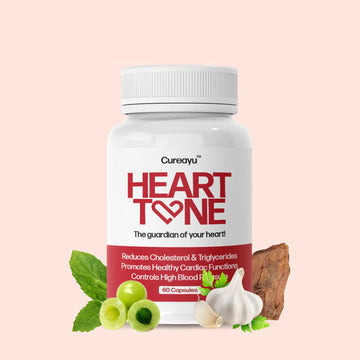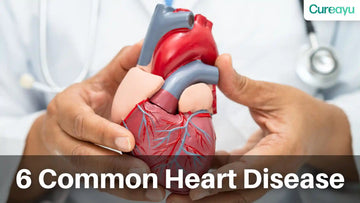As the world continues to navigate the uncertainties of the Covid-19 pandemic, questions and concerns surrounding the safety and efficacy of vaccines have become prevalent. One such concern that has gained attention is whether Covid-19 vaccines are truly affecting the heart. In this blog post, we will delve into this topic to provide clarity and insight on what you need to know about the relationship between Covid-19 vaccines and heart health. Let's separate fact from fiction and explore this important issue together.
Reason For Increase In Heart Stroke After Covid 19
Since the start of the pandemic, there has been an increase in reported cases of heart stroke among individuals who have contracted Covid-19. This is a cause for concern as heart stroke is a serious condition that can lead to long-term health complications or even death if not treated promptly. But what exactly is causing this rise in heart strokes after Covid-19?
One possible reason for this increase could be due to the effects of the virus itself on the cardiovascular system. Studies have shown that Covid-19 can cause inflammation throughout the body, including in the blood vessels leading to the heart. This inflammation can result in blood clots forming which can block arteries and lead to a heart attack or stroke.
Another reason for this spike in heart strokes could be related to post-Covid syndrome, also known as "long Covid". Some individuals who have recovered from Covid-19 may experience lingering symptoms such as fatigue, shortness of breath, and chest pain which can increase their risk for developing heart-related issues.
However, it's worth noting that there are also concerns about certain types of Covid vaccines potentially causing heart problems. In particular, there have been reports of myocarditis (inflammation of the heart muscle) occurring after receiving mRNA vaccines such as Pfizer-BioNTech or Moderna. Myocarditis is a serious condition that can weaken the heart's ability to pump blood effectively and may require hospitalization for treatment.
Also Read: Protecting Your Heart: Essential Tips for Heart Health
How Covid 19 Affect Heart Health
- Covid-19 can cause inflammation throughout the body, including in the blood vessels leading to the heart.
- This inflammation may result in the formation of blood clots, which can block arteries and lead to heart attacks or strokes.
- Some individuals with Covid-19 may experience myocarditis, inflammation of the heart muscle, which can weaken the heart's ability to pump blood effectively.
- The virus can also contribute to heart damage by increasing the risk of conditions like heart failure and arrhythmias.
- Long-term effects of Covid-19, such as fatigue and shortness of breath, can strain the heart and increase the risk of developing heart-related issues.
- Pre-existing heart conditions may worsen in individuals who contract Covid-19, leading to complications and increased mortality rates.
- Covid-19 patients with severe respiratory symptoms may experience a drop in oxygen levels, putting additional strain on the heart and exacerbating existing cardiovascular issues.
Side Effects Of Covid 19 Vaccine
- Common side effects of Covid-19 vaccines include pain, redness, and swelling at the injection site.
- Some individuals may experience fatigue, headache, muscle pain, chills, fever, or nausea after vaccination, which typically resolve within a few days.
- Less common side effects may include swollen lymph nodes, joint pain, and allergic reactions such as hives or swelling of the face and throat.
- Reports of rare side effects like myocarditis or pericarditis, inflammation of the heart or surrounding tissues, have been associated with certain Covid-19 vaccines, particularly mRNA vaccines like Pfizer-BioNTech or Moderna.
- Other rare side effects may include blood clotting disorders like thrombosis with thrombocytopenia syndrome (TTS), which have been observed with adenovirus vector vaccines such as AstraZeneca or Johnson & Johnson's Janssen vaccine.
- It's important to note that the occurrence of severe side effects from Covid-19 vaccines is extremely rare, and the benefits of vaccination in preventing severe illness and death from Covid-19 far outweigh the risks.
- Individuals experiencing severe or persistent side effects after vaccination should seek medical attention promptly.
Covid Vaccine Symptoms
- Following Covid-19 vaccination, individuals may experience mild symptoms similar to those of a common cold or flu, such as fatigue, headache, muscle aches, or low-grade fever.
- Injection site reactions, including pain, redness, or swelling, are common and usually resolve within a few days.
- Some individuals may develop more pronounced symptoms, such as fever, chills, or nausea, particularly after the second dose of mRNA vaccines like Pfizer-BioNTech or Moderna.
- These symptoms are generally mild to moderate and tend to resolve on their own within a few days.
- Allergic reactions to Covid-19 vaccines are rare but can occur. Symptoms of an allergic reaction may include hives, swelling of the face or throat, difficulty breathing, or a rapid heartbeat.
- Severe side effects such as anaphylaxis (a severe allergic reaction) are extremely rare but require immediate medical attention.
- It's important to note that experiencing symptoms after vaccination is not necessarily a cause for concern and is often a sign that the body is building immunity to the virus. However, individuals should consult a healthcare provider if they have any concerns about their symptoms or if symptoms persist or worsen over time.
Also Read: Heart Attack Rate In India
Conclusion
In conclusion, while reports of heart inflammation associated with Covid-19 vaccines have surfaced, it's crucial to recognize that these occurrences are exceedingly rare and predominantly mild in nature, as affirmed by vigilant monitoring from the CDC and FDA. Understanding the facts about vaccine safety empowers individuals to make informed decisions for their well-being. Moreover, vaccination remains an indispensable tool in our collective fight against this relentless virus. By taking proactive steps to protect ourselves and our communities, such as staying updated on vaccine information and embracing preventive measures, we can forge a path towards a safer and healthier future.












